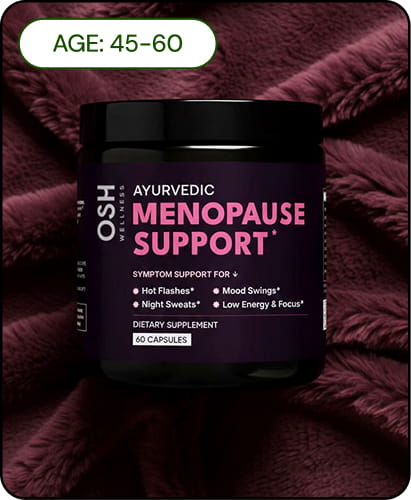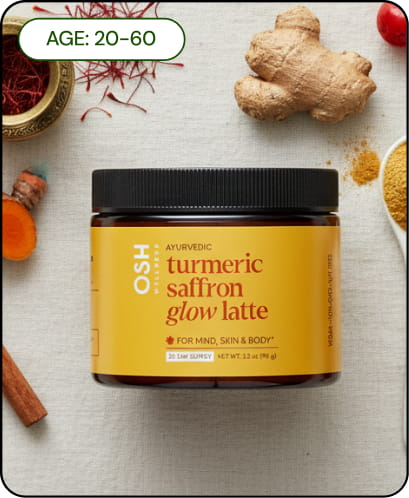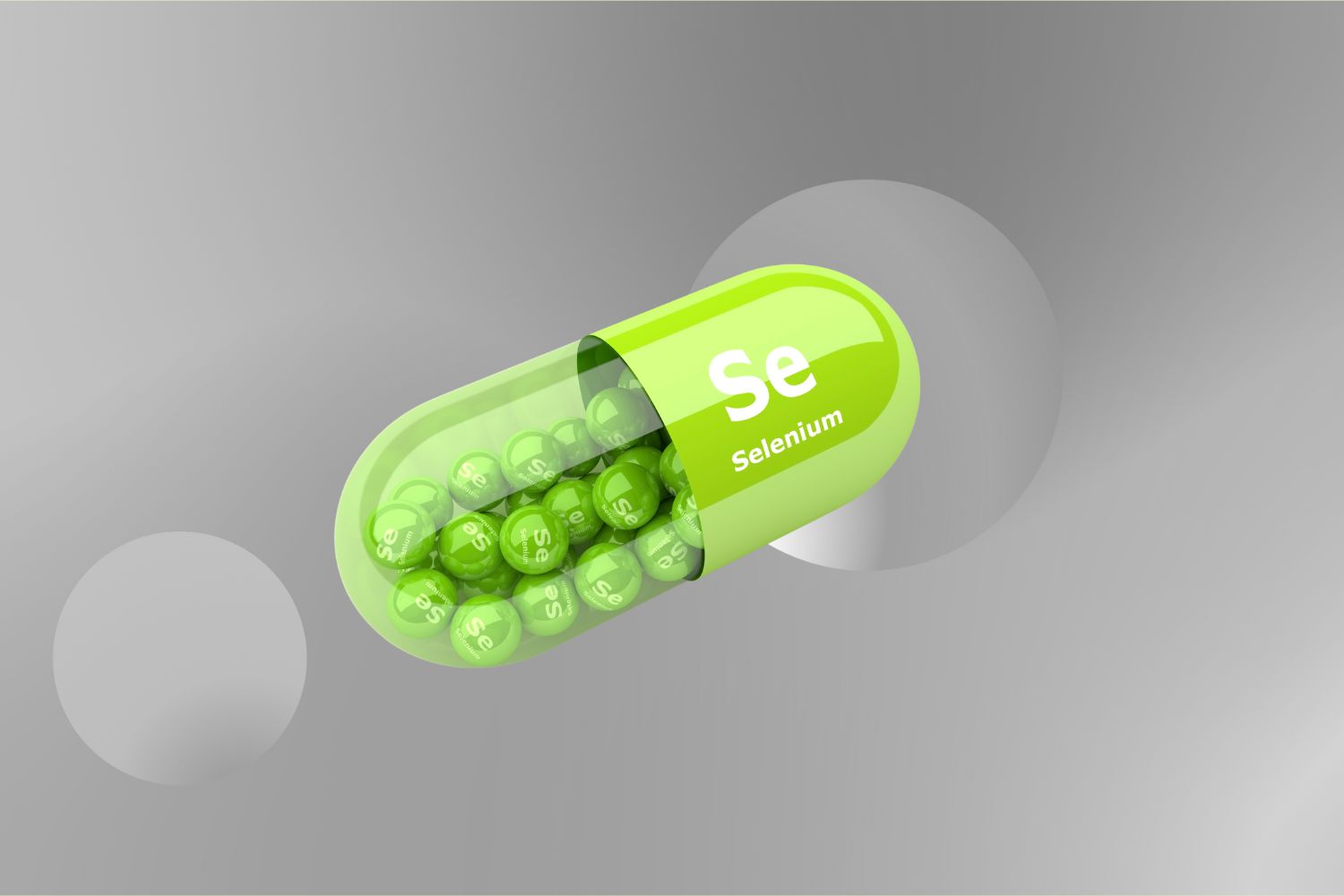Table of contents
Selenium may not be as popular as supplements like Vitex or CoQ10, but there's no denying its excellent health benefits. An essential mineral, benefits of selenium can support many facets of your health. It's important to know that selenium can only be obtained through your diet.
How can minor amounts of this crucial nutrient make such a significant difference? Read on to learn about the benefits of selenium and how to add it to your diet!
What Does Selenium Do?
Selenium is an essential mineral that your body does not naturally produce. It is commonly found in the soil, making it appear in some foods and water. As you can't make your own selenium, you must obtain it from what you eat. Thankfully, most individuals only need small amounts of this mineral.
Nevertheless, it plays a crucial role in many bodily functions, such as metabolism, thyroid function, and immune system health. It is needed to produce proteins, called selenoproteins, and some enzymes. These compounds help make DNA and protect your cells against damage and infection. Some individuals also take selenium for fertility as the mineral plays a role in reproduction.
What is Selenium Good For?
The mineral is excellent for a variety of things, and there are selenium benefits for men and women. Here is a breakdown of the many reasons why you want to ensure adequate selenium levels.
1. It is necessary for thyroid health
Your thyroid gland relies on selenium to function correctly. Not surprisingly, the highest concentrations of selenium in your body are found in this organ. As an antioxidant, selenium helps to protect your thyroid against harmful oxidative damage. It also plays a role in thyroid hormone production.
Poor thyroid function can wreak havoc on your metabolism, translating into issues with energy, weight, temperature regulation, and more. Additionally, your thyroid is responsible for growth and development. Too little selenium may correlate with thyroid conditions like hypothyroidism or Hashimoto's. Your thyroid hormone levels are also important when you are TTC or pregnant, so maintaining adequate selenium levels is crucial for mamas and mamas-to-be!
2. It's an Antioxidant
Free radicals are unstable atoms that can lead to cell damage, resulting in illness and aging. Although they're normal and serve a purpose in your body, too many of them, from things like oxidative stress, can cause issues. Alternatively, antioxidants prevent cell damage from free radicals.
Antioxidants are found in food, and selenium is a potent free-radical fighter. Adequate levels of selenium and other antioxidants help control oxidative stress, reducing free radical levels. When free radicals are neutralized, they can no longer result in damage linked to chronic conditions such as Alzheimer's, heart disease, premature aging, stroke risk, and cancer. Staying topped up on selenium is a great way to defend your cells.
3. Can Help Prevent Heart Disease
It is thought that selenium plays a role in heart health. Inadequate selenium has been correlated with a higher risk of heart disease. The decreased risk may stem from selenium's ability to lower inflammation, a significant risk factor for heart disease.
Oxidative stress is also linked to plaque buildup in arteries, known as atherosclerosis. Selenium helps defend against oxidative stress, possibly decreasing your chances of heart disease, stroke, and heart attacks.
4. May Lower Your Risk of Certain Cancers
Oxidative stress and high free radical levels are linked to many adverse health outcomes, including cancer. Selenium's power to fight oxidative stress and lower DNA damage equals an immunity boost, which can help destroy cancer cells.
One study found that high selenium levels in an individual's blood were associated with lower lung, breast, prostate, and colon cancer risks. However, this study focused only on food-based selenium and not supplements. Nevertheless, selenium obtained through supplements has been found to reduce radiation-induced diarrhea in women undergoing treatment for cervical and uterine cancer, improving their quality of life.
5. It is Great for Fertility
Selenium is excellent for fertility due to its role in fighting oxidative stress. Less cell damage from free radicals means better sperm and egg quality. A selenium deficiency is linked to low-quality semen, reduced sperm count, and poor sperm motility. The mineral is also essential for testosterone, an important reproductive hormone.
In women, selenium contributes to healthy ovarian follicle development, the site of egg development. It may also help support a healthy egg environment by decreasing free radical levels. Selenium deficiency in pregnant women has been associated with lower birth weight. If you're TTC, adding selenium-rich foods to your diet won't hurt!
Fertility Support for Couple with Selenium, CoQ10, and more
Fertility support developed by experts. This supplement bundle contains a blend of natural herbs and vitamins, including Selenium, CoQ10, Shatavari, and Ashwagandha.
6. Improves Cognition as You Age
As you age, your memory and cognition can decline. Alzheimer's, in particular, severely affects your memory and harms your behavior and thinking. While there is no cure or guaranteed prevention for the degenerative disease, it's thought that high levels of free radicals and oxidative stress may play a role. This is true of other neurological disorders, such as Parkinson's.
One study found that Alzheimer's patients possessed lower selenium levels. Furthermore, antioxidants may benefit those patients' memory. Experts also discovered that the Mediterranean diet, which is rich in selenium-containing foods, is linked to a decreased risk of Alzheimer's. Eating foods or taking supplements containing high selenium levels might help to delay the onset of neurological diseases and improve memory.
7. Supports Your Immune System
Your immune system is important in keeping you healthy by defending your body from parasites, viruses, and bacteria. As an antioxidant, selenium assists your immune system by lowering oxidative stress. Reduced oxidative stress helps decrease inflammation levels, which boosts immunity.
Some studies show that adequate selenium levels result in enhanced immunities. Those deficient in selenium may experience decreased immune cell function and delayed immune response. If you have a condition like HIV, tuberculosis, or even influenza, proper selenium intake may help boost your immune system and result in fewer hospitalizations.
8. May Support Respiratory Health
Asthma is a chronic respiratory condition affecting your airways. Inflammation is a predominant symptom, leading to wheezing, tightness in your chest, and difficulty breathing. Like other conditions, asthma is linked to oxidative stress.
As an antioxidant that fights this type of stress, selenium may help to reduce inflammation. As a result, the mineral might help lessen asthma symptoms. Though those with asthma have been found to have lower levels of selenium, more research is needed to learn if selenium supplementation could help control asthma symptoms.
9. Can Improve Hair & Nail Health
Selenoproteins, the type of proteins associated with selenium, are essential for hair and nail health. Splitting hair or brittle nails is thought to be linked to nutrient deficiencies, like low levels of selenium. Additionally, its antioxidant properties prevent cell damage and aid hair and nail maintenance and growth.
How Can You Add Selenium to Your Diet?

Selenium is found in the following foods:
Brazil nuts
Oysters
Eggs
Sardines
Sunflower seeds
Halibut
Chicken breast
Shiitake mushrooms
There are some plant-based foods as well, but their selenium levels can be affected by the selenium levels in the soil where they were grown. As a result, a diverse diet rich in many different selenium sources may be best. Alternatively, selenium supplements may be recommended, but it's best to speak with your doctor first.
A potent and important mineral, selenium is vital for many bodily functions. Whether you're TTC, want to support your immune system, or simply hope to improve your overall health, selenium is an excellent nutrient to add to your diet.
Author Bio
Shruti is the founder of Freshly Moms. She is a professional plant-based chef from Natural Gourmet Institute, NY and a certified IIN health coach. She has been working with Ayurveda, food & nutrition for over 10 years and is also a fresh mom herself.
This article is not a medical advice and is not meant for every situation. Every woman's body is different and may respond differently to treatments or supplements.








